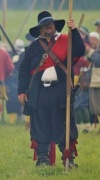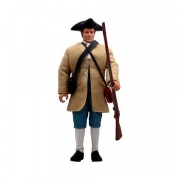The Brig - Brigadier Peter Young DSO, MC and two bars - has come up in several conversations recently both here and on Facebook, so to avoid hi-jacking dombom's thread about his excellent gun emplacement, I thought I would put a few comments here.
If you want to read about his history in more detail go here - https://en.wikipedia.org/wiki/Peter_Young_(historian)
PY or the Brig as he was known, was everything the wikipedia article says - part of the formative history of the British Commandos, he fell out with Churchill, and so never reached the heights he could have done, but I am sure that if you had asked him, he wouldn't have been bothered. He became a historian and formed a network of like-minded friends and worked with them to write his books on the English Civil War.
The books are dated now, the historiography of the conflict has moved on, evolved, and attitudes have changed. BUT - and it is a big 'but', PY's books still contain a lot of very important information because it is original information, collected together in a more accessible format. The people that the Brig worked with collected documents - one of our mutual friends had copies of the Shrewsbury Billetting Documents (a series of accounst of what soldiers were billetted where in the town and how much people were claiming for them). And PY used the information in these documents in his books. So his books re-cycle this and make them available outside of this little circle of friends.
It is important to mention here that one should always be careful when reading extant information to be aware of the original writer's biases, or where facts may be wrong. The best way I can describe it would be to say - for example - if you were a writer 350 years from now, examining the history of the 45th US President - if you looked at one set of pro-Trump documents, you would think he was the greatest man who ever walked the earth. If you looked at another set of documents - say from the NY Times or Washington Post - you might form the opposite opinion. Sometimes people don't do this and stories get repeated, without even the simplest pf questions and they become 'facts'.
The books are still good to read though - Edgehill (it was the publicity event for this that started the idea of the Sealed Knot off), Marston Moor andCropredy Bridge, are all good accounts of the battles with lots of useful supporting information.
As for the man. I was fortunate to meet him several times and each time was memorable.
In 1981 I had just written a pamphlet on 17thC slang, the Brig was selling his books out of the back of his car, so I offered him one of mine! "Of course!" he said, "Will you buy one of mine in exchange?" Fair swop, I suppose, especially as he signed it. And i have the satisfaction of knowing that in his preserved library this is one of my pamphlets.
Another time - 1985 - the Sealed Knot refought the 1685 Battle of Sedgemoor. The regiment I was with at the time - the King's Lifeguard of Foote, were stood in a potato field, and we were grubbing up new potatoes with our feet and throwing them at the Duke of Monmouth and his troops across the rhine - pronounced 'reen'.
PY rolls up. Being the right-hand marker and there being no officers about I called the troops to order to show the man the respect he deserved. He inspected us, told me off for having a dirty buckle on my baldric, and we stood chatting. That was the man, he was never so far above you he wouldn't spend time just chatting.
I offered him one of the potatoes. He looked at it, rubbed the fresh skin off it with his thumbs and looked at me, and I KNEW, just knew he was going to come out with a corker.
"When I was a commando," he said in his Colonel Mainwaring voice, "I could live on one of these, for a week." He was trying it on, he knew it, I knew it and he knew I knew it.
"Begging your pardon, my lord," I told him, "But that is b***-s**t!"
He looked me straight in the eye and said "Certainly is!" Then he drew his arm back and threw his potato at the back of the Duke of Monmouth's head. Dead centre!
The guy playing the Duke had been slowly losing his rag with us, but there was nothing he could say when he turned round and saw the Brig chortling like a school boy.
PY was also a wargamer, and like everything else he was full on about it. His wargames table was so big it needed hatches to access the central part of the table. Of course being who he was he would often wait until his opponent's troops were ON a hatch and then he would find a need to use it, pitching their soldiers over on their heads.
The man was a full-on legend.
People have said, "I saw the Brig on his white horse" but did you notice the two members of his body guard that were stationed either side of him to stop him falling off? He later took to just wandering through the battlefield and when people tried to capture him, he would engineer a cartoonish fight which would see his erst-while captors being thrown about Bugs Bunny-fashion as the Brig walked off.
While he enjoyed the pomp and circumstance of being the Brig and the founder of the Sealed Knot, he also enjoyed the cameradery of it, of being 'one of the lads'.
He also had this thing about rules. PY was in a privileged and respected position. Everyone in the SK at that time knew him, and he was treated with respect. He didn't need to show his membership card, you didn't need to check his authorisation. he was the Brig.
But woe betide you if you didn't ask for his card.
On gate duty once, I stopped his car and asked to see his membership before allowing him onto the camp-site, as I would with all members. He blustered and he stuttered his indignation, before he played his ace card - "Bu_ but I'm the Bloody Brigadier!"
"I don't care if you're God's Appointed on this earth. Card please your excellency!"
And he showed his membership card - member number 001.
The other guys with me thought I had lost it, but one of his underlings later appeared and said that the old man was most pleased.
To look at him, your first thoughts involved the white hair and Father Christmas. But when you really looked, even late in his life, you saw his eyes - like a pair of matched Luger barrels. He was still the officer of commandos who told his men - whilst under fire to lie down, as "standing corn is a good defence against machine gun fire."
As previously stated the Brig was a full-on legend, I count it one of the great privileges of my life to have met him, and to have lived.
General
The Brig.
4 posts
• Page 1 of 1
-

steve_pickstock
- Posts: 1341
- Member since:
20 Jun 2010, 19:56
Great recollections of this larger-than-life man, thank you Mr Pickstock.
A great deal has been written about the English Civil Wars since the volumes that 'The Brig' authored or c-authored all those decades ago. It's worth remembering how (relatively) little there was for on the military history of the Wars for the general reader/amateur historian until his books came out. His books on Edgehill, Marston Moor and Naseby, and Cropredy Bridge (Co-authored with Margaret Toynbee) will always form treasured part of my ECW library.
A great deal has been written about the English Civil Wars since the volumes that 'The Brig' authored or c-authored all those decades ago. It's worth remembering how (relatively) little there was for on the military history of the Wars for the general reader/amateur historian until his books came out. His books on Edgehill, Marston Moor and Naseby, and Cropredy Bridge (Co-authored with Margaret Toynbee) will always form treasured part of my ECW library.
-

Minuteman
- Posts: 1141
- Member since:
06 Mar 2020, 21:38
Minuteman wrote:A great deal has been written about the English Civil Wars since the volumes that 'The Brig' authored or c-authored all those decades ago. It's worth remembering how (relatively) little there was for on the military history of the Wars for the general reader/amateur historian until his books came out. His books on Edgehill, Marston Moor and Naseby, and Cropredy Bridge (Co-authored with Margaret Toynbee) will always form treasured part of my ECW library.
This is true.
Prior to the Brig's Edgehill, the most important work on the ECW was Charles Firth's Cromwell's Army in 1902. Still a very readable history as it isn't just about Cromwell's army but does cover the Royalist army as well. However, Firth had a reason for writing his book, quite an important reason.
With Queen Victoria coming to te end of her reign it is generally considered that Firth's book was a plug for Parliament. An attempt to show how important Parliament was now that the strong rule of the Queen was coming to an end. So in that sense it was a political book rather than a military history.
The Brig's books started a series of books that were plain military histories - him, and Wilf Emberton (a lovely man, as opposite to the Brig as chalk is to cheese, and still remembered with fond memories by those who knew him) they kick-started it all.
I recall one of the original Sealed Knotters telling me that the 'garden party' that was held to mark the publication of Edgehill in the form of a 'battle re-enactment' was so much fun that "they decided to do it again" - and that was how the knot began. Similarly the reception of a pure military history of this crucial period in English History sparked a whole slew of books and the re-examination of the period.
-
Santi Pérez likes this post. •
- Reply
-

steve_pickstock
- Posts: 1341
- Member since:
20 Jun 2010, 19:56
Different world back then. Going to the library and getting all excited, finding they'd acquired a new wargaming/military history book... making a grand total of half a dozen to drool over!
It's good sometimes to have a wander down memory lane.

It's good sometimes to have a wander down memory lane.

-

Harry Faversham
- Posts: 561
- Member since:
16 Nov 2013, 13:56
4 posts
• Page 1 of 1
